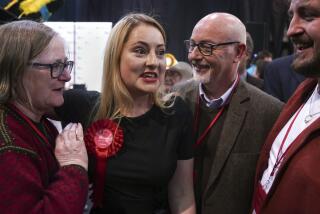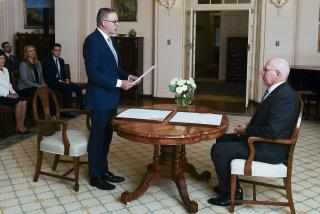Australia Leader Wins Rare 3rd Term in Office : Hawke May Strengthen Hold on Lower House; Control of Crucial Senate Remains in Doubt
- Share via
SYDNEY, Australia — Prime Minister Bob Hawke won a third consecutive term in office Saturday as Australian voters rejected offers of tax cuts from the conservative opposition in favor of the governing Labor Party’s pledge to restructure an ailing national economy.
Hawke, 57, former leader of the Australian trade union movement, bested the Liberal Party, led by John Howard.
With 63% of the popular votes counted when the tallying was halted Saturday night, Labor had won at least the 82 seats it held in the previous 148-seat House of Representatives, Australia’s lower chamber. The Liberals--who, in spite of their name, are a right-of-center group--were leading in 42 races and the allied, farmer-based National Party in 19. The contests in five districts were too close to call.
No votes will be counted today, and final results may be known Monday.
The Labor Party lost ground in the states of New South Wales, Victoria, South Australia, the Northern Territory and Western Australia but made gains in Queensland and Tasmania.
Parliamentary System
Under the nation’s parliamentary system, the outcome in the 76-seat Australian Senate is crucial, as the upper chamber has the power to reject legislation enacted by the House of Representatives.
That result will not be known for days, and the effectiveness of Hawke’s government depends on it. Late Saturday night, Labor had 34 Senate seats, the Liberal Party 28, the National Party 5, and 3 were held by independents. The tiny Australian Democratic Party seemed to again hold the balance of Senate power with six seats.
The opposition parties were caught by surprise when Hawke called elections nine months ahead of the time required. They were embroiled in ideological differences provoked by the National Party, a right-wing group, which demanded tougher measures against unions, smaller-scale government and a 25% flat-rate tax. Liberal Party leader Howard, 47, senior partner in the uneasy coalition, tried to woo voters by offering to slash the maximum tax rate from 49% to 38%. Hawke moved to take advantage of their disarray.
With his reelection Saturday, Hawke said that his main goal in the three years of his next term will be to make Australia more competitive internationally. “I’ve made the judgment that the Australian people are mature and intelligent and that they can understand we’ve had to tighten our belts and accept some lower (living) standards,” Hawke said before the polls closed.
Currency, Banking Issues
His government has already established a record for pragmatic and moderate economic management, under which the Australian dollar was floated--detached from any single standard such as gold and left to find its true exchange value. Hawke also proposed the entry of foreign banks into Australia.
With the six-week campaign fought substantially on tax and other economic issues, there was little focus on foreign policy. That prompted one newspaper to call it Australia’s most boring election.
Hawke--in his first term, which began in 1983--had presided over the fastest economic growth in a decade--cutting inflation, raising business profits and employment.
He faced tougher times in his second term. By mid-1986, a range of economic problems contributed to a drop in his personal popularity. Hawke asked support for government policies to bring down interest rates of 17% and curb a huge $78-billion foreign trade deficit, which he attributed largely to a plunge in world commodity prices.
Hawke’s triumph represented the first time that a prime minister from the Labor Party, a left-center group in an American political context, had won a third term in office.
The nation’s longest-serving prime minister was Robert Gordon Menzies, a conservative patriarch who led Australia from 1939 until 1941 and then again for 17 years, from 1949 until 1966.
Opposition Struggle Seen
It was Howard’s first contest as Liberal Party leader. Political commentators predicted a contest for the leadership and said that likely contenders include former party leader and Finance Minister Andrew Peacock and industrialist John Elliot.
Howard congratulated Hawke on the victory Saturday night, adding: “Whatever differences that divided us . . . those things that unite Australians are much more important and enduring. Now I’m going to have a drink.”
Hawke, once a two-fisted drinker himself, held a Guinness Book of World Records mark for guzzling 2 1/2 pints of beer in 12 seconds when he was a Rhodes Scholar at Oxford in 1955. On Saturday, he said he would savor his victory “with several cups of tea.” Hawke gave up drinking shortly before becoming prime minister.
Voting is mandatory in Australia, and federal election officials estimated that 95% of the nation’s 10.3 million eligible voters cast ballots. In contrast to usual summertime elections with bikini-clad voters at the beaches, the election was held for only the second time during the Australian winter--the reverse of U.S. seasons, as Australia is situated in the Southern Hemisphere.
More to Read
Sign up for Essential California
The most important California stories and recommendations in your inbox every morning.
You may occasionally receive promotional content from the Los Angeles Times.













